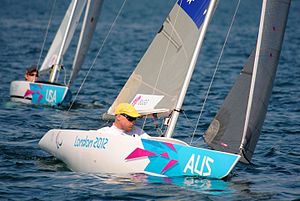

I spoke to Matt Bugg regarding his regatta preparation and practice. Matt is a man who has not let adversity stand in his way to achieve great things in our sport.
After becoming a paraplegic in a snowboarding accident at 23, Matthew decided to try to reach the pinnacle of Parasailing, first in Australia and then internationally sailing the very competitive 2.4-metre single-hander.
He has won National Championships and countless races culminating in a Silver medal at the 2016 Olympic Games in RIO.
Excerpts from that interview are copied below:
Brett: Leading up to a regatta, how important is practice time? And what do you consider as a minimum?
Matt: Everyone knows it’s the most important thing in yacht racing is time in the boat. But also that time has got to be valuable.
If you’re just going out and sailing around the river on your own for 10 hours a week, is that going to be as valuable as going out for three hours a week and doing lots of short sharp racing against 10 other boats?
Not only is it time in a boat but it’s primarily, valuable time in the boat.
Brett: You said you’ve been doing some two-boat training in recent times and obviously if you can’t get a fleet, you’re much better off sailing against someone else you know and you can both try different things.
Matt: Generally, the more boats, the better, is sort of our rule. The more people on the race course and simulate racing, the better. Two-boat tuning is important if you have a really good tuning partner.
If you’re sailing against someone who’s not particularly quick, it can actually do you harm rather than add value to your program.
Finding a training partner and a training partner that’s really fast, because if you’re sailing against someone that’s slow and you’re going out there beating him and feeling great, and then you get to a race situation and you’re actually not as quick as you think you are.
Brett: So what you’re saying is choose your tuning partners carefully.
Matt: Absolutely. Yes. Be as nice as you can to the fast guys and hopefully, they won’t mind you coming out and tuning up with them.
And then that, of course, is in their best interests as well because if they can get you going fast, then all of a sudden, you become a valuable tuning partner for them.
Brett: Have you got any secrets to your success in managing all those other details in putting together a regatta?
Matt: Yeah, get someone else to do it. I mean, it also gets your mind off doing the reading, or gets you away from doing the reading that you’d like to be doing and all that time spent on the phone and so on. So, yeah, get someone else to do it. That’s probably a really good tip.
I mean, I’ve always been really sort of quite detailed in the preparation of my boat. I hate racing my boat when it’s not absolutely perfect.
I’ve probably done a bit more boat maintenance than other people who spend a bit more time sailing. It’s always a trade-off, whether your boat’s first of all going to get around the course without having any problems and also whether it’s working properly and it’s going to function to your requirements.
It’s all a tradeoff. If I miss out on a day of practice, am I going to make that up by spending a day in the boat park making adjustments to the boat that may help me go faster?
Brett: On race day, do you have any special preparations you do?
Matt: Yeah. I mean, I’m always certainly more serious on race day. I’ll certainly get down to the boat park, a bit earlier.
And the most important thing is just getting out on the water much earlier. We try and sail up to the start boat with at least 50 minutes to the first warning signal. Preferably about an hour so you can get a few beats in on either side of the course. A few upwinds and downwinds, and really try and get a bit of an idea of what the wind’s doing.
Brett: That’s pretty important. There’s nothing else you do ashore? You don’t have some quiet time, go off and meditate for a while or anything like that?
Matt: No, not really. When I say I get down there earlier on race days, I’m still never the first person in the boat park.
I don’t like to hang around and chat with people all morning talking about boats and sort of bullshit around the boat park.
The pl to get down there, get the boat set up, and go out racing.
I try and avoid chatting with too many other people, especially competitors, and especially talking about boat setups and general race talk. I like to keep that for either after the race or after the regatta.
There’s nothing worse than getting down to the yacht club and someone putting a silly idea in your head before you go out racing.
So basically you get down to the boat park with your mind in race mode. You build up to getting out to that start boat an hour early.
A lot of people, get a kick out of just doing a regatta. Sort of hanging around and the social side of it, but for me, I am trying to win the regatta.
I just want to get out on the water and get into the racing and not spend too much time on other things.
If it’s sunny, you’re standing out in the sun and I much prefer just to be as fresh as possible. When I get out onto the water I want as much energy as I can have and to be as switched on as possible.


